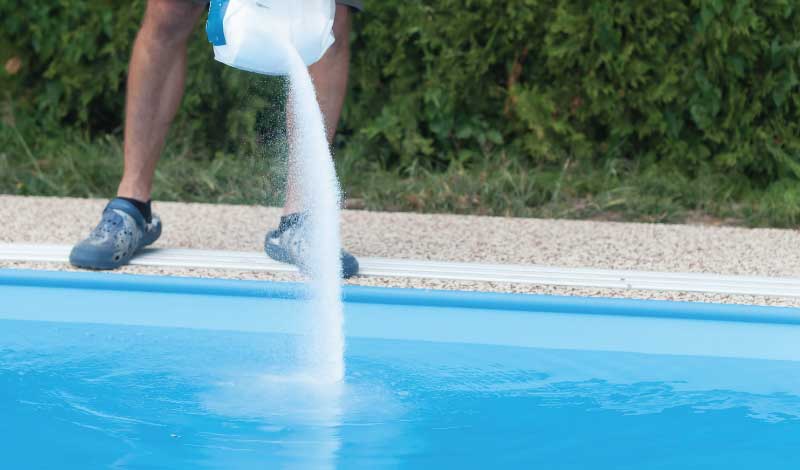Of all the pool disinfectants, chlorine is by far the most commonly used. Practical, effective, and economical, it nevertheless poses certain dangers to the health of swimmers. In this article, we explain what it is and how to prevent these risks.
Chlorine and chloramine
First of all, you should know that chlorine is not dangerous in itself.
Total chlorine = active chlorine + chloramine
It is the active chlorine that has the disinfecting power. When it comes into contact with organic substances, such as dead leaves, sweat, or urine, some of the active chlorine reacts, which results in the production of combined chlorine, also called chloramine, in the water. Chloramine is the molecule responsible for the harmful effects of chlorine: bad smell, irritation, itchy eyes, etc.
Important: Discover the best water purification systems in Scottsdale, AZ. Enjoy clean, safe, and pure water with our top-rated filtration solutions. Contact us today!
This is why the dosage of total chlorine takes into account the active chlorine level and the chloramine level in the water. This must not exceed 0.6 mg/L of total chlorine. All swimming pools contain chloramine: the reaction occurs gradually in the water, causing the disinfectant to lose its effectiveness. It is therefore necessary to regularly check the level of your pool water. To prevent excessive chloramine formation, it is best to take a shower before swimming.
Risks of Chlorine in a Swimming Pool
Swimming pools are sometimes overdosed with chlorine, especially hotel pools or public pools. They are also often very busy, which increases the chloramine level and makes the water particularly aggressive.
Common problems with overly chlorinated and/or poorly balanced chlorine water include:
- Strong characteristic odor;
- Red and irritated eyes;
- Irritation of the skin and mucous membranes, itching;
- Dry and brittle hair.
Furthermore, competitive swimmers are more likely to develop allergies and asthma: two to three times more likely than other athletes! Recent studies even show a correlation between regular contact with chlorinated water and the development of lung diseases.
In children, the dangers of chlorine are increased:
- Higher risk of developing eczema;
- Higher risk of developing an allergy to dust mites or pollen, which can lead to rhinitis or allergic asthma;
- Greater likelihood of respiratory risks.
Swimmers have red eyes and complain of irritation, the water becomes cloudy or the smell of chlorine is very strong. Be careful: your pool is showing signs of excessive chlorination! If, in a person, these symptoms are repeated constantly and at a greater intensity than in others, he or she may suffer from a chlorine allergy.
In any case, it is best to take a shower after swimming in a chlorine-treated pool. Even if you do not feel any irritation, chlorine dries out your skin and hair: do not hesitate to moisturize. For your eyes, you can use swimming goggles and then rinse them with saline solution. People with asthma should avoid swimming after adding the treatment, as vapors may be present for some time on the surface of the water.
Important: Get the best water purification systems in Phoenix, AZ for pure, clean drinking water. Explore our advanced filtration solutions and improve your water quality today!
Finally, don’t fall into paranoia: swimming pool chlorine presents long-term dangers only in the case of regular swimming (several swims per week). Alternatives exist to maintain your swimming pool: salt, bromine, or active oxygen, these treatments are healthier for swimmers!
